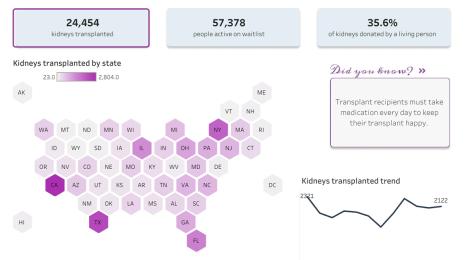Introspection and Action: An open letter from Tableau CEO Adam Selipsky
The tragedies and brutality that have occurred over the past weeks have left us with heavy hearts. Together with our community we honor and mourn the lives of Breonna Taylor, George Floyd, Rayshard Brooks, Ahmaud Arbery, Riah Milton, Dominique Fells, Malcolm Harsch, Robert Fuller, and so many others who were taken. And I’m personally heartened to see so many people across the country stand up, speak out, march, and demand real, lasting change to end systemic racism against Black people in the United States. That progress will not happen without tremendous effort, and demands honest examinations of ourselves, our organizations, and our public institutions. Data must be a part of that process, helping people recognize truths and reconciling actions with the vision of the world we want to see.
As CEO, I take responsibility for Tableau being a part of that progress, both in our actions within the company and in how we support changemakers in communities everywhere.
In this vein, I am pleased to announce that Tableau is launching its Racial Justice Data Initiative, including a new three-year, $10m expansion of the Tableau Foundation’s Equity work. Working with leading national equity organizations, we’re bringing what we do best—help everyone see and understand data—to partnerships that will empower local changemakers to use data directly to address the prejudice, violence and structural inequities facing Black communities across the country. We hope those changemakers will include everyone from local non-profits to national advocacy groups to Federal, State and Local government.
That work will include an equity data hub as a central resource to make more data available for anyone to learn more about issues of race and equity in their area. Data on these issues are often incomplete, difficult to access, and—frankly—potentially dangerous if misrepresented in a way that reinforces biases and stereotypes. We will work with partners who have expertise in the ethical and responsible use of race and ethnicity data to make more of it accessible, easy to explore, and ensure they are paired with educational resources to help users develop context for their analyses. And as always, we will call on the incredible power of the Tableau Community to help in the effort. I am incredibly excited because—despite the challenges—we have seen what a difference we can help create with partners and data, in areas including health, poverty, homelessness and gender equality. We plan to have more on the data hub and partnerships in the coming weeks.
We also understand that Tableau must reflect the diversity of our customers and our world. We can’t fulfill our mission of helping people—all people—see and understand data if our team doesn’t represent the communities in which we all live and work. I recognize that we are not where we want to be in terms of diversity across our company, including our leadership team. We know we still have more to do to build a more racially and ethnically diverse Tableau. In partnership with the leadership at Salesforce, we are working through plans to invest in our efforts to increase Black employee representation, as well as overall increases in the number of underrepresented minorities in the company over the next few years. This includes revisiting our processes and making the needed changes to how we recruit, hire, advocate for, promote, retain, and champion the success of our Black colleagues at all levels.
And while we think about investments in our own company’s diversity, we are doing the same with our Tableau Community. In the coming months, we are going to create a Community Equity taskforce to help drive change and improve the diversity of our global Community, our Ambassador and Zen Master Programs, and user groups. In addition, our Academics team will focus on specific programs to help more BIPOC students build data skills and networks as they start their careers.
Throughout all of this, data is core to the process. With data, police departments, advocacy groups, and individual people can generate changes in policing that can dramatically reduce violence against Black people. With data, people can insist on changes to discriminatory policies and biases built into education, housing, employment, healthcare, and banking systems that deprive so many of opportunity. And with data, people can change policies to empower others, enfranchise communities, and eliminate the barriers to progress that have stood for too long.
The challenges are many. The problems are entrenched. But we have the ability and the willpower to make a difference. Let’s go make it happen, all of us together.








